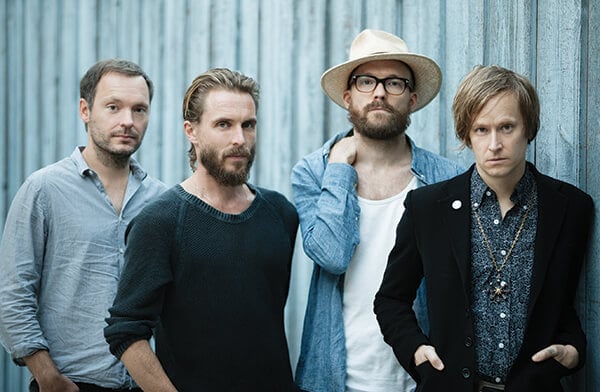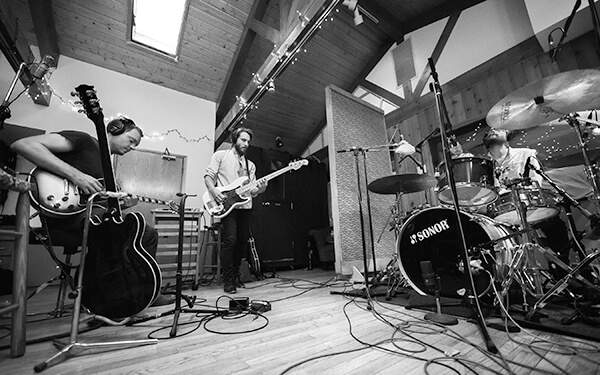We Dance To All The Wrong Songs: The Story of REFUSED’s First Album in Nearly 20 Years
Q&A with Dennis Lyxzén on songwriting, the band’s accidental fame, and their new record, Freedom.
On October 6, 1998, in Harrisonburg, VA, four boys from Umeå, Sweden found themselves in a crowded basement with 45 Americans. Not even four songs into their set, police arrived and threatened to arrest anyone who played on. This, after an arduous tour and mounting internal tensions, would be their last show. The band called it quits and vowed to “never play together again” in an open letter.
The Shape of Punk to Come seemed like it would never arrive.
Having gone their separate ways for over a decade, focusing on diverse solo projects, the original members of Refused, including hardcore’s elder statesman, Dennis Lyxzén, joined forces in 2012 to create a chimerical bombination: they reunited.
Now, three years later they are back with a ferocious new album that is both earnest and exquisite. Freedom is a dynamic and calculated progression from their magnum opus, The Shape of Punk to Come, but equal parts contemporary and iconoclastic.
For Lyxzén, after more than two decades, several dozen albums and an estimated 500 nights of sleeping on the stage after a show, the explosive front man looks backwards, and forwards, on a life in music, harnessing creative potential and breaking the band’s legend.
————————————————————————————————————

In the 20 years since releasing your debut This Just Might Be…The Truth, what has or hasn’t significantly changed, personally, and for the band?
We could talk about that for hours. When you’re young and you get together and force people to be part of your crew and play music with a naïve idea about how it works it just seems to happen. Then Refused became a proper band. None of us had any idea that it was going to become a big band that was going to be part of our lives forever.
We never anticipated the way Refused became this huge entity that just kept going…without us for a long time. Now it’s been 20 years of touring, recording and seeing the world. In some ways you could say, everything has changed.
Describe the creative process behind Freedom.
It was a very intense process. I wasn’t sure that it was a good idea to do another record. I mean, I’m a pragmatic man and I look at the world and I see the legacy, the back catalogue and the expectations.
The other three guys, Kris [Steen], David [Sandström] and Magnus [Flagge] were already writing music that wasn’t Refused related, and once we did the reunion in 2012, they said, ‘Maybe this is music that could be Refused’s music.’
When they asked me if I wanted to be a part of it, I was very skeptical because of the legacy and the past and I have another band [INVSN] that I am very focused on. But, when I get curious I can’t stop myself—I had to see what this was going to be like.
Then it got really intense. This wasn’t just being in a band and practicing your friends’ songs. With Refused the bar is pretty fuckin’ high. The standards of the music that we created were as well. There’s no end to how much we can work on a song.
Typically, Kris comes up with the riffs then David applies structure to those. I come in with lyrical ideas and David and I work together to structure the lyrics and finalize the song.
Discuss some of the themes that exist on the record, lyrically and sonically.
Sonically, we wanted to make something that was both aggressive and interesting. When people heard it, we wanted them to be certain they were hearing a new Refused record. We wanted it to be challenging.
Our producer, Nick Launay [Yeah Yeah Yeahs, Arcade Fire], really sought to capture our live sound in the recording.
Lyrically, it’s ten different songs with ten different concepts. One overlying theme is that we aim to examine and deconstruct the meaning of the capless structures and ideologies that we live under and how that affects people.

Leading up to the recording of Freedom, in the time since Refused was last writing new material, what are some modern influences that are evident on this record, musical or otherwise?
In your youth you’ll often hear a song and try to emulate that sound. Now that we’re older we were more decisive. We wanted to write a record that sounded like a Refused record.
Individually our influences may vary within the group and may be completely different than they were 17 years ago, but leading up to this we all knew what kind of record we wanted to make.
At one point in time The Shape of Punk to Come was mixed in 5.1 surround sound, which was unheard of for a hardcore-punk LP. Can you explain any creative and innovative production techniques used on Freedom?
Initially, that record was mixed regularly, and the surround sound was applied to a special edition. I own it, but have only listened to that version once. I was in a cinema.
For Freedom, I was very hands-off in the production process. I’ve recorded between 25-30 records, but have never been too interested in that phase of the process. I just try and stay focused on my role in the music.
In growing from a D.I.Y. group to a band with international acclaim, describe how the band’s resources have developed and changed.
When we were young pups on a small label we were recording on a tight budget.
Then we became a big band without even trying—we broke up and became a big band.
Now there is a little more leverage about how to manage your life and a bit more of a budget. Life on tour is a bit more comfortable than it was in the ’90s when we toured in a van and slept on floors.
The same goes for recording. When we did the first record, This Just Might Be…The Truth, we had three days to lay down all of the music and two days to lay down all of the vocals. My voice was shot cause we were out playing shows. So I did the vocals and my voice doesn’t sound good. Back then there was no concept for us to be like, ‘Oh, maybe I’ll come back next week and redo the vocals,’ because that was not in the budget.
This time around, we worked on the record until it was done. That’s a big difference between being ‘Refused 2015’ as opposed to ‘Refused 1993’. [Laughs]
I loved that part of my life and it’s good for your soul to do, but at 42 I kind of want to sleep in a bed and shower—it changes. But I’ve done 500 shows where I slept on the stage. It’s all part of the process.
You mentioned Nick Launay produced this album. What was it about his track record and creative approach that attracted the band?
My other band, INVSN, was making a record a few years ago and as we were looking for someone to mix it, his name kept coming up. I thought, ‘Holy shit! This guy is working on some amazing records.’ After he mixed a few tracks on that record, he came to an INVSN show and was super excited and wanted to work together again.
I said to him, ‘I have another project I’m working on. It’s called Refused.’ He was very excited and started hassling me about working with us on the new album. After discussing it with the other guys, Kris explained how he knew him and was a major fan of his work.
It was easy. In addition to the Yeah Yeah Yeahs and Arcade Fire records, he’s done the last seven Nick Cave records and worked with Gang of Four and Birthday Party. We wanted to capture that rawness of our sound and he was able to do so spectacularly. We were lucky enough to work with him. He is both a fantastic producer and a wonderful person.
Throughout the 2000’s, The Shape of Punk to Come became noted as a highly influential album to many musicians. During this time period, did the reverie and shadow cast by Refused affect you or other projects you were involved in?
Not particularly. I’m not a nostalgic person and I never chased fame or acclaim—I just wanted to express myself. Anything else I’ve ever done musically has never sounded like Refused.
The way it would affect me is that when I would put out a record with another band and people would say, ‘Aww, man! It doesn’t sound anything like Refused.’ None of those records were supposed to sound like Refused. It’s been an unfair comparison in that a lot of the music I have made has ended up in the shadow of Refused, which at times has been a bit frustrating.
It was all very weird. We broke up and then The Shape of Punk to Come became this entity and Refused became this thing that kinda just took off. People just kept reminding me how much they love Refused, but for a long time I felt very disconnected from it. It became something that was no longer relatable to my life.
What is it about what you do that keeps you from doing something else?
I absolutely love doing this. I really love playing live. There is a special emotional connection that transcends the mundane aspect of everyday life. I was very young when I got bit by that ‘thing’ and I knew that I just wanted to continue doing it.
I’ve put out a couple of records that, in hindsight, weren’t that great and people weren’t excited about. But, I’ve been lucky enough to release a couple of records that people are excited about. It’s all a part of it.
When I was young I knew I was ‘different’ from most kids. I was fortunate enough to find punk rock to help me define the feeling of being different. The older I get, the more different from the world I become. This is where I belong.
Follow on Twitter @Refused
Photography by Dustin Rabin
